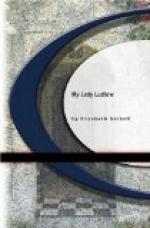owner of the house lived, a Marquise de Crequy, a
widow. They tell me that the Crequy coat-of-arms
is still emblazoned, after all these terrible years,
on a shield above the arched porte-cochere, just as
it was then, though the family is quite extinct.
Madame de Crequy had only one son, Clement, who was
just the same age as my Urian—you may see
his portrait in the great hall—Urian’s,
I mean.” I knew that Master Urian had
been drowned at sea; and often had I looked at the
presentment of his bonny hopeful face, in his sailor’s
dress, with right hand outstretched to a ship on the
sea in the distance, as if he had just said, “Look
at her! all her sails are set, and I’m just off.”
Poor Master Urian! he went down in this very ship not
a year after the picture was taken! But now
I will go back to my lady’s story. “I
can see those two boys playing now,” continued
she, softly, shutting her eyes, as if the better to
call up the vision, “as they used to do five-and-twenty
years ago in those old-fashioned French gardens behind
our hotel. Many a time have I watched them from
my windows. It was, perhaps, a better play-place
than an English garden would have been, for there
were but few flower-beds, and no lawn at all to speak
about; but, instead, terraces and balustrades and
vases and flights of stone steps more in the Italian
style; and there were jets-d’eau, and little
fountains that could be set playing by turning water-cocks
that were hidden here and there. How Clement
delighted in turning the water on to surprise Urian,
and how gracefully he did the honours, as it were,
to my dear, rough, sailor lad! Urian was as
dark as a gipsy boy, and cared little for his appearance,
and resisted all my efforts at setting off his black
eyes and tangled curls; but Clement, without ever showing
that he thought about himself and his dress, was always
dainty and elegant, even though his clothes were sometimes
but threadbare. He used to be dressed in a kind
of hunter’s green suit, open at the neck and
half-way down the chest to beautiful old lace frills;
his long golden curls fell behind just like a girl’s,
and his hair in front was cut over his straight dark
eyebrows in a line almost as straight. Urian
learnt more of a gentleman’s carefulness and
propriety of appearance from that lad in two months
than he had done in years from all my lectures.
I recollect one day, when the two boys were in full
romp—and, my window being open, I could
hear them perfectly—and Urian was daring
Clement to some scrambling or climbing, which Clement
refused to undertake, but in a hesitating way, as
though he longed to do it if some reason had not stood
in the way; and at times, Urian, who was hasty and
thoughtless, poor fellow, told Clement that he was
afraid. ‘Fear!’ said the French boy,
drawing himself up; ’you do not know what you
say. If you will be here at six to-morrow morning,
when it is only just light, I will take that starling’s
nest on the top of yonder chimney.’ ’But
why not now, Clement?’ said Urian, putting his
arm round Clement’s neck. ’Why then,
and not now, just when we are in the humour for it?’
’Because we De Crequys are poor, and my mother
cannot afford me another suit of clothes this year,
and yonder stone carving is all jagged, and would tear
my coat and breeches. Now, to-morrow morning
I could go up with nothing on but an old shirt.’




